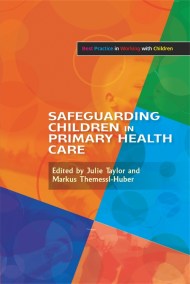The application of assessment frameworks hinges on human qualities and skills which are naturally prone to bias and inconsistency. Making Sense of Child and Family Assessment aims to support workers in analysing and making sense of the information gathered, and increasing accuracy and empathy in assessing the needs and risks for vulnerable children and young people.
This book offers best practice guidance on how to analyse information gathered during the assessment of children and young people and their families. Good assessments take time and need to be appropriately resourced. A range of analytical tools are also needed if practitioners are to present assessments of children’s needs which lead to meaningful care plans and improved outcomes. Helm introduces the key messages emerging from policy and research, and provides insights into today’s multi-disciplinary practice.
Professionals working in child welfare and protection roles, such as social workers, health visitors, midwives and teachers will find this practical guide to analysis invaluable in interpreting needs and outcomes.
This book offers best practice guidance on how to analyse information gathered during the assessment of children and young people and their families. Good assessments take time and need to be appropriately resourced. A range of analytical tools are also needed if practitioners are to present assessments of children’s needs which lead to meaningful care plans and improved outcomes. Helm introduces the key messages emerging from policy and research, and provides insights into today’s multi-disciplinary practice.
Professionals working in child welfare and protection roles, such as social workers, health visitors, midwives and teachers will find this practical guide to analysis invaluable in interpreting needs and outcomes.
Newsletter Signup
By clicking ‘Sign Up,’ I acknowledge that I have read and agree to Hachette Book Group’s Privacy Policy and Terms of Use
Reviews
The book draws on the most up to date research into what works best for children. It goes on to provide practical, realistic suggestions as to how practitioners in social work, health and education can aim to achieve enhanced resilience and safety of the children under their care... The author, Duncan Helm, Senior teaching fellow at Sterling University has sensibly and coherently put together the subject matters of searching and seeing, building the picture, developing explanations, using intuition effectively, whilst keeping the child at the centre in order to make sense of the assessment. The book aims to fill the gap in the field of analysing children's needs, which is a crucial and most demanding part of the assessment process. The book places emphasis on how the practitioner's skills and human qualities play a role in assessment of a child's needs and in approaching recommendations. The book provides an overview of the key elements of theory behind the practices, and explains quite lucidly issues such as how information gathering, and their analyses by different professionals in different sectors leads on to develop hypotheses about cases. The readers will find the book informative of theories behind many activities that we, the health care professionals in particular, may already be carrying out without conscious knowledge of the bases. The professional development this book may potentially offer to the readers it to instil confidence in the work that we often do by default in the fields of safeguarding and assessing a child's need. The theoretical knowledge base would go on to add credence to any service development.
If you are a practitioner trying to make sense of all the changes, and how best to integrate the various tools you have been asked to use with your own observations, to analyse and formulate easy to understand plans - without losing sight of your all important 'gut feeling' - then this is the book for you. Easy to read, helpful and above all informative, the book has seven very easy to grasp chapters, each jam-packed with information... I commend the author for his ability to describe the various links between government objectives, target setting and research, all somehow set out within a context that understands the challenges of working within the 'real world' of social care.... This book explains the 'what', the 'why' and the 'how' of it all - in other words, what's relevant to the work we do.






